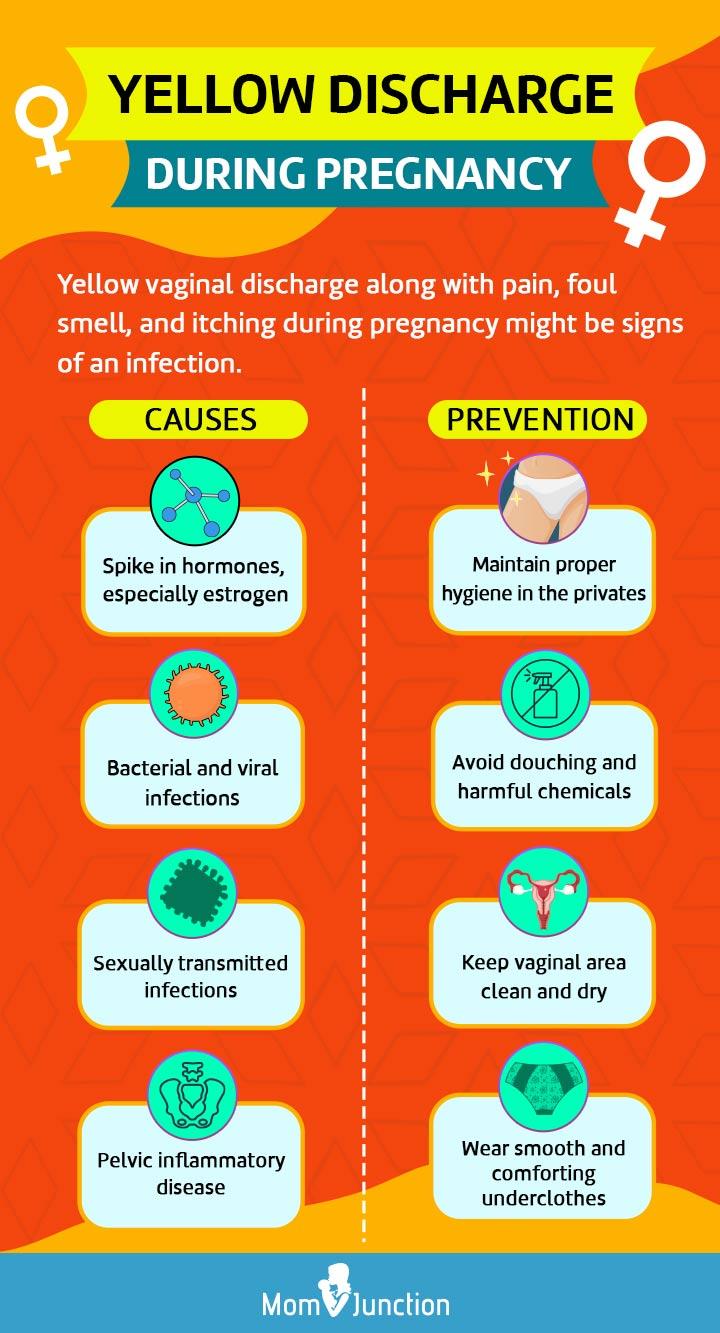Whitish Yellow Discharge Pregnancy - Yellow discharge during pregnancy isn't always cause for concern. Yellow discharge is generally nothing to worry about; Yellow discharge is particularly concerning if paired. However, it can be a sign of an infection or a leak in the amniotic sac that protects a fetus in the womb. Here’s what you need to know, plus whether your symptoms warrant a call to your health care. Normal pregnancy discharge tends to be clear or milky white. So if you notice that your discharge is yellow, it could signal that something is up. If you’re pregnant and have yellow vaginal discharge, make an appointment to see your doctor. It can, however, be a sign of infection if accompanied. Early pregnancy discharge can also have a whitish hue (like the color of skim milk).
It’s usually caused by hormonal changes or small amounts of menstrual blood mixing with your cervical fluid. However, it can be a sign of an infection or a leak in the amniotic sac that protects a fetus in the womb. If the white vaginal discharge is accompanied by itching or burning, however, it could be a sign of a yeast infection or bacterial infection, says. It can, however, be a sign of infection if accompanied. If you’re pregnant and have yellow vaginal discharge, make an appointment to see your doctor. Yellow discharge during pregnancy isn't always cause for concern. Early pregnancy discharge can also have a whitish hue (like the color of skim milk). So if you notice that your discharge is yellow, it could signal that something is up. Yellow vaginal discharge could be a sign of an infection. Yellow discharge is generally nothing to worry about;
Normal pregnancy discharge tends to be clear or milky white. If you’re pregnant and have yellow vaginal discharge, make an appointment to see your doctor. Early pregnancy discharge can also have a whitish hue (like the color of skim milk). Yellow vaginal discharge could be a sign of an infection. So if you notice that your discharge is yellow, it could signal that something is up. Yellow discharge is generally nothing to worry about; Yellow discharge is particularly concerning if paired. It’s usually caused by hormonal changes or small amounts of menstrual blood mixing with your cervical fluid. However, it can be a sign of an infection or a leak in the amniotic sac that protects a fetus in the womb. If the white vaginal discharge is accompanied by itching or burning, however, it could be a sign of a yeast infection or bacterial infection, says.
Yellow Discharge During Pregnancy Causes And Treatment
If you’re pregnant and have yellow vaginal discharge, make an appointment to see your doctor. However, it can be a sign of an infection or a leak in the amniotic sac that protects a fetus in the womb. It’s usually caused by hormonal changes or small amounts of menstrual blood mixing with your cervical fluid. Yellow vaginal discharge could be.
Yellow Discharge During Pregnancy Possible Causes And Treatment
Here’s what you need to know, plus whether your symptoms warrant a call to your health care. If the white vaginal discharge is accompanied by itching or burning, however, it could be a sign of a yeast infection or bacterial infection, says. Early pregnancy discharge can also have a whitish hue (like the color of skim milk). It’s usually caused.
Yellowish discharge 8 weeks pregnant r/pregnancyproblems
Yellow discharge is generally nothing to worry about; Yellow discharge is particularly concerning if paired. Early pregnancy discharge can also have a whitish hue (like the color of skim milk). Yellow discharge during pregnancy isn't always cause for concern. It can, however, be a sign of infection if accompanied.
Yellow Discharge During Pregnancy Causes And Treatment
So if you notice that your discharge is yellow, it could signal that something is up. If the white vaginal discharge is accompanied by itching or burning, however, it could be a sign of a yeast infection or bacterial infection, says. Yellow discharge is particularly concerning if paired. Normal pregnancy discharge tends to be clear or milky white. Yellow discharge.
Yellow Discharge During Pregnancy What’s Normal And When To Seek Help
Here’s what you need to know, plus whether your symptoms warrant a call to your health care. Yellow discharge is particularly concerning if paired. Yellow discharge during pregnancy isn't always cause for concern. Yellow discharge is generally nothing to worry about; If you’re pregnant and have yellow vaginal discharge, make an appointment to see your doctor.
What Is Yellow Discharge During Pregnancy
Early pregnancy discharge can also have a whitish hue (like the color of skim milk). Here’s what you need to know, plus whether your symptoms warrant a call to your health care. It can, however, be a sign of infection if accompanied. Normal pregnancy discharge tends to be clear or milky white. It’s usually caused by hormonal changes or small.
Yellow Discharge During Pregnancy What to Know
Here’s what you need to know, plus whether your symptoms warrant a call to your health care. If you’re pregnant and have yellow vaginal discharge, make an appointment to see your doctor. Yellow vaginal discharge could be a sign of an infection. Yellow discharge during pregnancy isn't always cause for concern. If the white vaginal discharge is accompanied by itching.
Yellow Discharge during Pregnancy Archives Healthpulls
If the white vaginal discharge is accompanied by itching or burning, however, it could be a sign of a yeast infection or bacterial infection, says. It can, however, be a sign of infection if accompanied. Yellow vaginal discharge could be a sign of an infection. It’s usually caused by hormonal changes or small amounts of menstrual blood mixing with your.
pregnancy discharge? please respond!!!!! its milky white on my finger
So if you notice that your discharge is yellow, it could signal that something is up. Yellow vaginal discharge could be a sign of an infection. Yellow discharge during pregnancy isn't always cause for concern. Normal pregnancy discharge tends to be clear or milky white. Early pregnancy discharge can also have a whitish hue (like the color of skim milk).
Picture of yellowish discharge 13 dpo Trying to Conceive Forums
Yellow discharge during pregnancy isn't always cause for concern. Early pregnancy discharge can also have a whitish hue (like the color of skim milk). Here’s what you need to know, plus whether your symptoms warrant a call to your health care. It can, however, be a sign of infection if accompanied. If you’re pregnant and have yellow vaginal discharge, make.
Here’s What You Need To Know, Plus Whether Your Symptoms Warrant A Call To Your Health Care.
If you’re pregnant and have yellow vaginal discharge, make an appointment to see your doctor. However, it can be a sign of an infection or a leak in the amniotic sac that protects a fetus in the womb. If the white vaginal discharge is accompanied by itching or burning, however, it could be a sign of a yeast infection or bacterial infection, says. So if you notice that your discharge is yellow, it could signal that something is up.
Normal Pregnancy Discharge Tends To Be Clear Or Milky White.
Yellow discharge during pregnancy isn't always cause for concern. Yellow discharge is particularly concerning if paired. Early pregnancy discharge can also have a whitish hue (like the color of skim milk). Yellow discharge is generally nothing to worry about;
It Can, However, Be A Sign Of Infection If Accompanied.
Yellow vaginal discharge could be a sign of an infection. It’s usually caused by hormonal changes or small amounts of menstrual blood mixing with your cervical fluid.





:max_bytes(150000):strip_icc()/VWH_Illustration_A-Guide-to-Discharge-Color-During-Pregnancy_Illustrator_Katie-Kerpel_Final-c2f81059281e443f9f3b6bf19229a7bb.jpg)


